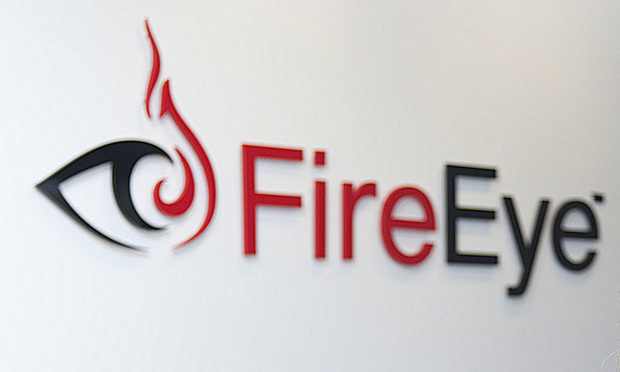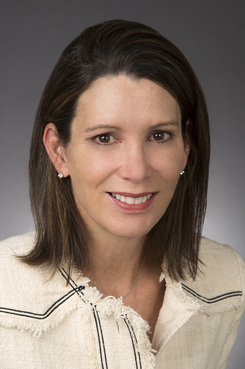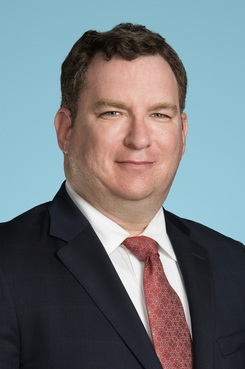Cybersecurity Vendors and Law Firms Partner Up, But Caution Still Advised
While partnerships between cybersecurity companies and law firms are on the rise, “there is a lot of potential for conflicts of interest,” said one partner at an Am Law 100 firm.
April 05, 2018 at 05:05 PM
5 minute read

With fears spreading as each highly publicized corporate data breach commands more attention and woes in the executive suite, law firms have more opportunities these days to point corporate clients in the direction of particular cybersecurity vendors or even offer up their own skilled cybersecurity professionals.
Such cross-selling opportunities are not lost on cybersecurity vendors, at least a few of which have established programs to “partner” with law firms. Under those programs, law firms and vendors set up scenarios where they cross-sell to corporate clients in an effort to boost their respective revenues.
Milpitas, California-based FireEye Inc., along with its sister company Mandiant, which it acquired in 2014, offers cybersecurity operations and data-breach incident response services. In the past few years, FireEye has set up formal partnerships with more than five law firms, and informal partnerships with almost 20 firms, said Karen Kukoda, the company's senior director of strategic alliances. FireEye has since signed up five Am Law 100 partners: Baker & Hostetler; Holland & Knight; Pillsbury Winthrop Shaw Pittman; Ropes & Gray; and Weil, Gotshal & Manges.
No quid quo pro dictates permeate such partner relationships, Kukoda said. But FireEye, which went public in 2013, and its law firms often negotiate three-way master service agreements with clients. Since it started the partner program and as a direct result of it, FireEye has boosted its annual revenue by double-digit millions, Kukoda said. The company's revenue grew to $751.1 million in 2017, a 5 percent increase from the previous year.
FireEye and its partner firms offer clients and potential clients joint informational sessions and thought leadership events, Kukoda said. FireEye and firm partnerships allow each side to better understand the business of the other and thus more efficiently serve client needs, she said. After a breach, most clients first contact their insurance provider, who are ultimately expected to help pay for resolutions. So it helps that some of FireEye's partner firms serve on insurance cybersecurity advisory panels.
As a trio, the insurance provider, FireEye and its partner firms put a “holistic strategy in place to help a client with a data-breach incident,” Kukoda said.
But some lawyers, such as a Baker & Hostetler partner who participates in the firm's FireEye partnership, advise caution about any excess emphasis on cross-selling clients.
“There is a lot of potential for conflicts of interest,” said Baker & Hostetler partner Laura Jehl, co-leader of the firm's General Data Protection Regulation (GDPR), blockchain technologies and digital currencies initiatives.

Before joining the firm last summer, Jehl learned about cybersecurity from the in-house perspective when she served as general counsel and chief privacy and security officer at Resolution Health Inc., a subsidiary of health benefits giant Anthem Inc., which in 2015 acknowledged a massive cyberattack affecting 80 million customer records. (Anthem, advised by Hogan Lovells, agreed to a $115 million data breach settlement last year.)
Cross-selling has “potential pitfalls,” said Jehl, even though she recognizes that cybersecurity these days “is an area that has tremendous growth opportunity.” Bottom line, she warns: “Everyone has to be really careful.”
It's not that cybersecurity lawyers insist on distant ties to vendors. As a rule, most lawyers cannot deploy or even understand with any depth the forensic tools available and developed by such companies, many of whom make proprietary claims about those tools, Jehl said.
“You absolutely have to trust the vendors,” she added. “This is a necessarily close relationship.”
Jehl said that Baker & Hostetler remains a FireEye partner, but not an exclusive partner. She estimated that for about 50 percent of its recommendations, the firm sends clients to other cybersecurity vendors.
“We love FireEye, but we look at the size and scope of what the client needs,” Jehl said.
She knows of other law firms that have pursued exclusive relationships with cybersecurity vendors, or even hired their own professionals in-house, but she admits to being concerned about those trends.
“It's not the best idea,” said Jehl, noting that she instead prefers for clients to research and select their own cybersecurity firms if they have the resources.
Pillsbury partner Brian Finch, who joined the firm in 2014 and now serves as co-leader of its cybersecurity, data protection and privacy practice from Washington, D.C., said his firm both serves as counsel and partner to FireEye.

“We refer clients to FireEye and FireEye refers clients to us,” Finch said. “I'm not going to put words in FireEye's mouth, but they know this is a law firm that understands cybersecurity issues.”
David Lisi, a litigation partner at Pillsbury in Silicon Valley, who joined the conversation with Finch, noted that his firm is “not exclusively referring clients to FireEye.”
Finch agreed, noting that Pillsbury is “very careful” and strives “to act as honest brokers.” But Finch also said he was “comfortable as going on the record saying that FireEye is one of the best in the world.” Not every client, however, “can drive a Ferrari,” said Finch, noting that as a result, Pillsbury will send some cybersecurity matters to other vendors.
Will Pillsbury and FireEye's revenues continue to grow even if they each stop referring clients to one another? Finch is not worried about that at all.
“Anyone who is a legitimate authority on cybersecurity is seeing growth in their practice,” he said.
This content has been archived. It is available through our partners, LexisNexis® and Bloomberg Law.
To view this content, please continue to their sites.
Not a Lexis Subscriber?
Subscribe Now
Not a Bloomberg Law Subscriber?
Subscribe Now
NOT FOR REPRINT
© 2025 ALM Global, LLC, All Rights Reserved. Request academic re-use from www.copyright.com. All other uses, submit a request to [email protected]. For more information visit Asset & Logo Licensing.
You Might Like
View All
Troutman Pepper, Davis Polk Cases Put Partners' Feedback for Associates Under the Microscope
6 minute read
'Law Firms Are Really Expensive': How In-House Leaders Ensure They Get Their Money's Worth
6 minute read
SVB's Implosion Has Tech Companies Reeling. Here's What They Should Do

Law Firms Are Suing Ex-Clients More Frequently, Unwilling to Leave 6-Figure Legal Fees on Table
Trending Stories
Who Got The Work
J. Brugh Lower of Gibbons has entered an appearance for industrial equipment supplier Devco Corporation in a pending trademark infringement lawsuit. The suit, accusing the defendant of selling knock-off Graco products, was filed Dec. 18 in New Jersey District Court by Rivkin Radler on behalf of Graco Inc. and Graco Minnesota. The case, assigned to U.S. District Judge Zahid N. Quraishi, is 3:24-cv-11294, Graco Inc. et al v. Devco Corporation.
Who Got The Work
Rebecca Maller-Stein and Kent A. Yalowitz of Arnold & Porter Kaye Scholer have entered their appearances for Hanaco Venture Capital and its executives, Lior Prosor and David Frankel, in a pending securities lawsuit. The action, filed on Dec. 24 in New York Southern District Court by Zell, Aron & Co. on behalf of Goldeneye Advisors, accuses the defendants of negligently and fraudulently managing the plaintiff's $1 million investment. The case, assigned to U.S. District Judge Vernon S. Broderick, is 1:24-cv-09918, Goldeneye Advisors, LLC v. Hanaco Venture Capital, Ltd. et al.
Who Got The Work
Attorneys from A&O Shearman has stepped in as defense counsel for Toronto-Dominion Bank and other defendants in a pending securities class action. The suit, filed Dec. 11 in New York Southern District Court by Bleichmar Fonti & Auld, accuses the defendants of concealing the bank's 'pervasive' deficiencies in regards to its compliance with the Bank Secrecy Act and the quality of its anti-money laundering controls. The case, assigned to U.S. District Judge Arun Subramanian, is 1:24-cv-09445, Gonzalez v. The Toronto-Dominion Bank et al.
Who Got The Work
Crown Castle International, a Pennsylvania company providing shared communications infrastructure, has turned to Luke D. Wolf of Gordon Rees Scully Mansukhani to fend off a pending breach-of-contract lawsuit. The court action, filed Nov. 25 in Michigan Eastern District Court by Hooper Hathaway PC on behalf of The Town Residences LLC, accuses Crown Castle of failing to transfer approximately $30,000 in utility payments from T-Mobile in breach of a roof-top lease and assignment agreement. The case, assigned to U.S. District Judge Susan K. Declercq, is 2:24-cv-13131, The Town Residences LLC v. T-Mobile US, Inc. et al.
Who Got The Work
Wilfred P. Coronato and Daniel M. Schwartz of McCarter & English have stepped in as defense counsel to Electrolux Home Products Inc. in a pending product liability lawsuit. The court action, filed Nov. 26 in New York Eastern District Court by Poulos Lopiccolo PC and Nagel Rice LLP on behalf of David Stern, alleges that the defendant's refrigerators’ drawers and shelving repeatedly break and fall apart within months after purchase. The case, assigned to U.S. District Judge Joan M. Azrack, is 2:24-cv-08204, Stern v. Electrolux Home Products, Inc.
Featured Firms
Law Offices of Gary Martin Hays & Associates, P.C.
(470) 294-1674
Law Offices of Mark E. Salomone
(857) 444-6468
Smith & Hassler
(713) 739-1250










